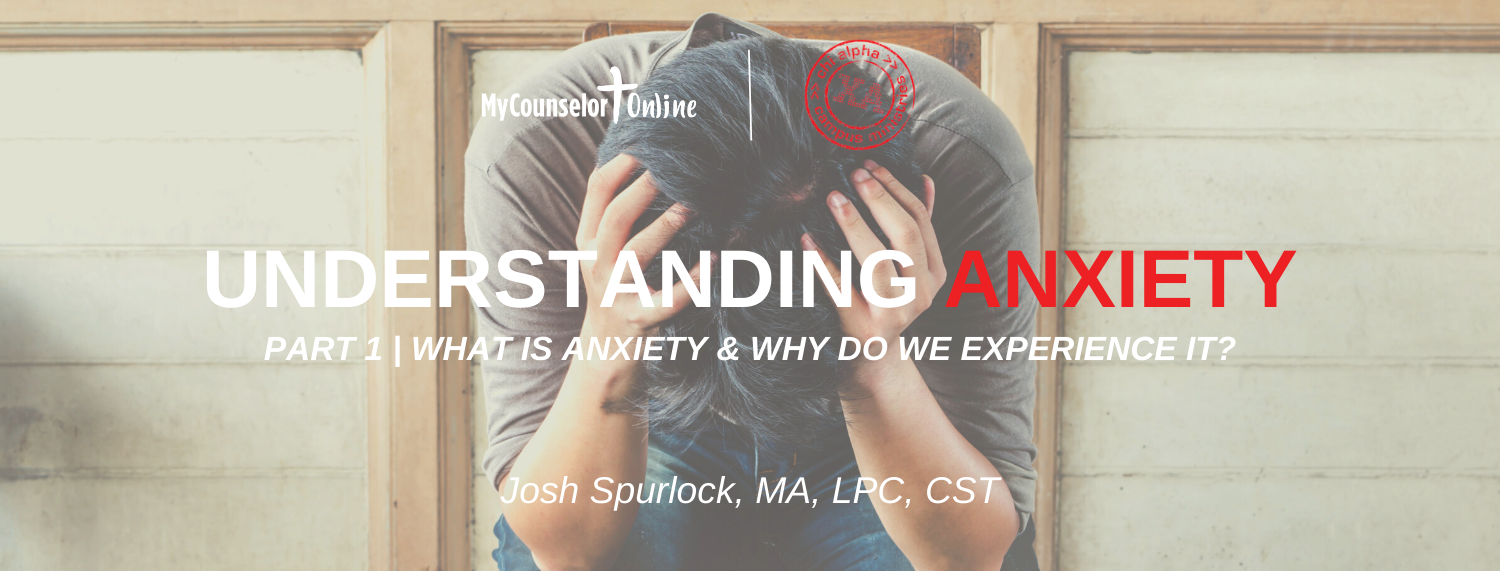This is a summarized version of the content presented in the Understanding Anxiety course. To dive deeper into this topic, check out the full Understanding Anxiety course.
In today’s culture of nearly constant stress, anxiety has become a pandemic. It looks different for everyone; for some it’s constant worry and fear, or racing thoughts and knots in the stomach, or even panic attacks and difficulty breathing.
But however anxiety hits you, almost all of us can relate to the burden that it brings. How can we ease the weight of anxiety? Let’s start by understanding what exactly anxiety is.
When God created us, He made us with a nervous system that responds to what’s around us, helping us navigate the world and respond to danger.
For example, imagine you’re on a hike in the woods. All of the sudden, a bear jumps out and starts running towards you. Thanks to the anxiety response in your nervous system, you respond by getting to safety as quickly as possible. In situations like these, we want that anxiety response to kick in and make us hyper-alert.
But what happens when the anxiety response kicks in when there isn’t a real threat? That’s when anxiety becomes a problem, and the symptoms that I mentioned earlier begin to interfere with your life.
To dive deeper into this topic of anxiety, check out the full Understanding Anxiety course.
What exactly is happening when these symptoms show themselves? To understand that, let’s take a look at neuroscience.
God designed us to take in data from the world around us through our five senses; sight, sound, smell, touch, and taste. Once our senses take in the outside information, our brain then assigns meaning to it, based on what we’ve learned from past experiences.
That’s why 30 people can observe an incident and walk away with very different ideas about what happened and why; we all have different life experiences, and therefore interpret new experiences differently.
Throughout the day, your senses are constantly taking in data from the outside world, and your brain is interpreting it. If your brain determines something as unimportant, then it subconsciously discards the data.
Your brain, by God’s incredible design, handles most of the information for you and only brings to your conscious awareness the things it thinks you need to focus on. This information gets relayed to your prefrontal cortex for your conscious consideration.
These thoughts then get filtered through stories that you tell yourself, based on your previous life experiences. Once attributed to a specific story, you then experience the emotions that are produced from that story. While you may not notice the story you’re telling yourself, you tend to notice the feelings created by the stories.
Feelings are a product of our glands and nerves. Glands do not make their own decisions; they do what the brain tells them to do. The brain tells them the interpreted story of what is happening, and your glands produce the emotions that go with that.
For example, imagine you’re driving down the road. All of the sudden, you see flashing red and blue lights in the rear-view mirror. Your brain very quickly recognizes this as bad, and that you’re in trouble. So your brain alerts the adrenal glands that you’re in trouble, and your adrenal glands then send a dose of stress hormones through your blood.
And the result?
You feel anxious.
Your heart’s pumping, hands are sweating, and muscles are tense, as the cop approaches your vehicle.
These emotions that our body produces tend to spur us towards action. If something doesn’t feel good, we do things to try to feel better. These are often referred to as coping mechanisms. There are healthy coping mechanisms such as praying or processing with a friend, and there are unhealthy coping mechanisms, such as binge eating or looking at porn.
We all have negative emotional experiences that produce anxiety. The key to mastering this anxiety, rather than allowing it to master you, is twofold. First, you need to learn healthy coping mechanisms that help you manage your reactions to anxiety producing situations. Next, you learn how to trace your path to anxiety backwards to identify the story that’s driving the anxiety. That’s what we’ll look at in Understanding Anxiety Part Two.
Cheering you on!
Josh Spurlock, MA, LPC, CST
Founder & Director of MyCounselor.Online
To dive deeper into this topic of anxiety, check out the full Understanding Anxiety course.
